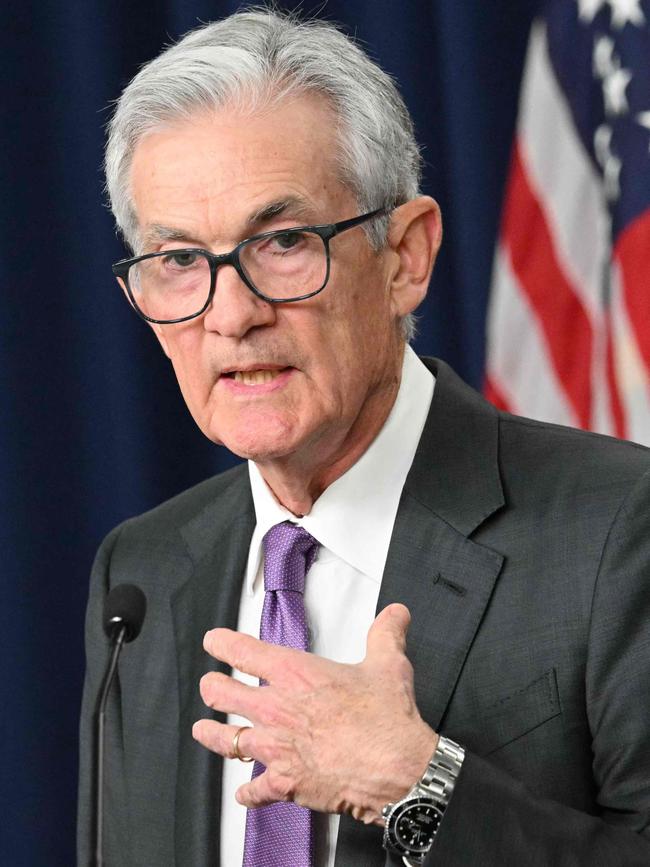Labor’s Made in Australia policy ‘risks higher inflation’, economists warn
Economists say the US’ extraordinarily loose budget settings were in part to blame for this year’s reacceleration in consumer prices, and warn of a similar challenge locally.

America’s extraordinarily loose budget settings are in part to blame for the country’s reacceleration in consumer prices and delayed rates relief, economists say, warning that Labor’s newly announced Future Made in Australia policy could have a similar inflationary impact here.
Hopes for interest rate cuts this year have been dealt a blow, after a third month of rising consumer prices in the United States triggered worries that Australia’s recent rapid progress in lowering inflation would also stall.
US Federal Reserve chair Jerome Powell early Wednesday morning signalled the Fed would wait longer to cut interest rates in response to a series of hot economic data, and that were price pressures to persist, then the central bank could keep rates steady for “as long as needed”.
Financial market traders responded by pushing back bets for rates relief in Australia, and now believe there is a material chance that the Reserve Bank will not deliver its first cut until early 2025.
Westpac chief economist Luci Ellis said the stubbornness of US inflationary pressures had “a lot to do” with the country’s loose fiscal policy, including the massive Inflation Reduction Act, or IRA.
The US is running a federal deficit worth 6 per cent of GDP, which in Australia is equivalent to a commonwealth budget shortfall of nearly $160bn.

“US fiscal policy has sustained a level of demand much higher than it otherwise would be. It’s the IRA, it’s also the fact they index their (income) tax brackets,” Dr Ellis said.
Ahead of a May budget which Jim Chalmers says will include “significant new public investments”, Dr Ellis said the ultimate size of the additional spending associated with the Made in Australia policy would determine the impact on inflation.
“What really matters is the size of the package and how much it adds to the level of demand,” she said.
“The government’s conscious that any support they provide needs to be targeted because they don’t want to have their fingerprints on a delayed rate cut, let alone a rate rise. The last thing they want to do is slow down Australia’s disinflation journey.”
Quarterly consumer price data next Wednesday is expected to show inflation eased from 4.1 per cent in the year to December, to 3.5-3.8 per cent, according to forecasts by economists at the four major banks.
Jim Chalmers on Wednesday would not be drawn on how much the government was prepared to spend as part of its Made In Australia policy.
“We expect that the net zero transformation as part of a Future Made in Australia will cost hundreds of billions of dollars in this country,” the Treasurer said.
“Now, obviously the commonwealth budget is not in a position to provide those kinds of sums, but what we are in a position to provide is big, significant investments, and you’ll see that in the budget,” he said.
“I’m enthusiastic about that, but that will inevitably be only a part and potentially a small part of the total funding and financing that we need to see to make our economy more modern and maximise the opportunities that are before us.”

NAB head of market economics Tapas Strickland said the American evidence of stubbornly high inflation in the services sector was already evident in Australia, and that this justified the more cautious view on the prospect of rate cuts in 2024.
Financial market pricing suggested the chance of a rate cut by December fell to just 70 per cent, Mr Strickland said.
Mr Strickland, who expects the first RBA rate cut in November, said most of the past year’s steep fall in inflation was in goods, and that rents, construction costs, and insurance costs were still rising quickly.
Mr Strickland agreed that government spending was “definitely” contributing to the stubbornly high inflation that was delaying rate cuts – “certainly in the US, but also here as well”.
“The government sector is competing with the private sector for resources, see that clearly in the infrastructure sector, which is affecting dwelling supply and costs,” he said.
“And there’s the potential for domestic manufacturing capability (through the Future Made in Australia Act) will add to that inflationary pressure, particularly for labour.”
IMF chief economist Pierre-Olivier Gourinchas this week warned that the American economy remained “overheated”, and that “this calls for a cautious and gradual approach to easing by the Federal Reserve”.
At the same time, Mr Gourinchas expressed deep concerns over the US’s massive deficit.
“The fiscal stance, out of line with long-term fiscal sustainability, is of particular concern,” he said.
“It raises short-term risks to the disinflation process, as well as longer-term fiscal and financial stability risks for the global economy. Something will have to give.”






To join the conversation, please log in. Don't have an account? Register
Join the conversation, you are commenting as Logout